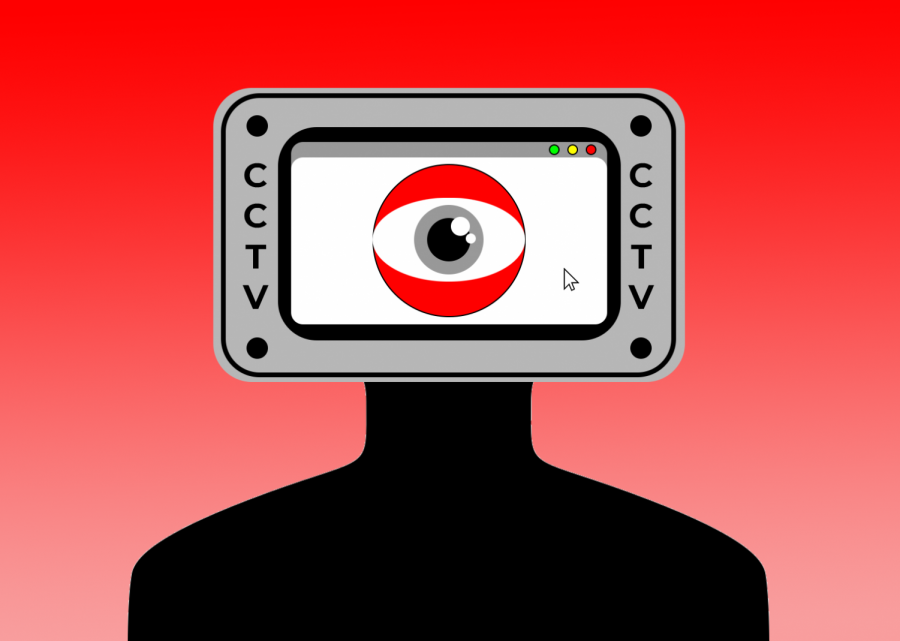All Eyes on You: The Perils of Surveillance During Remote Learning
Schools have implemented new programs to detect cheating, but are they invading students’ privacy?
Students across the country have voiced major concerns regarding their security and privacy as online proctoring programs monitor their every move.
Camera on. Microphone on. Eyes forward. Don’t move.
With schools switching to online learning, bedrooms have replaced classrooms as closures plague the nation, due to the global Coronavirus pandemic. Amidst the havoc, online ‘proctoring’ companies have quickly capitalized on the switch to virtual learning, selling programs designed to catch potential cheaters as they take their exams online. A quick Google search for ‘exam anti-cheat software’ reveals dozens of programs designed to monitor and track students’ behavior using video and audio.
Typically, students are required to turn on their webcams in order to allow these programs to analyze their movements. Using artificial intelligence, facial recognition algorithms may periodically scan a student’s video for any discrepancies. If their identity cannot be confirmed, they move out of frame, or multiple people are detected in frame, the program will send an alert to the student and their academic institution. In extreme cases, these algorithms may even track a student’s eye movements in order to determine the probability of cheating.
These companies are responsible for securing the information of every single student that they monitor, from the facial recognition data to the recordings of their movements. Consequently, this raises serious security and privacy concerns. “Who has access, what’s happening with the data, how does the AI review the data, where is this taking place – probably on the cloud, [but] how secure is the algorithm’s cloud infrastructure? Should schools enforce you to download this program on your private computer? The security risks are plentiful, and it’s not right for a school to enforce this,” an anonymous student said.
Many proctoring services state privacy as their top priority, vowing that they do not sell students’ data to third parties. Such information is destroyed unless their institution requests otherwise based on cheating allegations. Testing company ProctorU has even drafted a Student Bill of Rights following privacy concerns at the University of California, Santa Barbara.
Still, skepticism remains high. “I personally don’t mind showing my face, but I am slightly concerned about how the data is processed through faculty. At the bare minimum, I think that schools should provide full transparency as to how our data is being processed,” another anonymous student said.
Concerns also reach beyond the integrity of data storage. Examity, another monitoring service, requires remote proctors to actively watch students and their screen activity. In doing so, students must grant proctors remote access to their personal computers. Although Examity assures that they uphold strict security standards with each proctor going through extensive training, it does not mask the fact that students are putting their information in the hands of complete strangers. Even so, the company’s privacy policy warns, “Your transmission of your data to our Platform thus is done entirely at your own risk.”
Even if these services vow to protect students’ data, there is always the imminent threat of a massive data breach. In June 2020, a breach in the online learning platform OneClass exposed the emails, names, addresses, phone numbers, and school details of over a million students (most of them minors). In May 2020, the account details of more than 25 million Mathway users were found on the dark web. Also in June 2020, hackers gained access to India’s largest online learning platform, Unacademy, selling the account information of over 20 million users.
“There are a lot of ethical challenges that come with cheating software because as students, we put our faces sort of in their hands, yet all we have to trust them [with] are their statements that they are protecting our data,” said another anonymous student. With online proctoring, much more is at stake. Students’ faces, names, voices, school information, emails, and other personal information could be used for much more sinister acts, threatening their security and safety. It is only a matter of time until one of these proctoring companies faces a breach of their own.
“There are a lot of ethical challenges that come with cheating software because as students, we put our faces sort of in their hands, yet all we have to trust them [with] are their statements that they are protecting our data.”
Alex Tembelis is a News Editor for ‘The Science Survey.' He believes that journalistic writing has a responsibility to inform the public about world...

